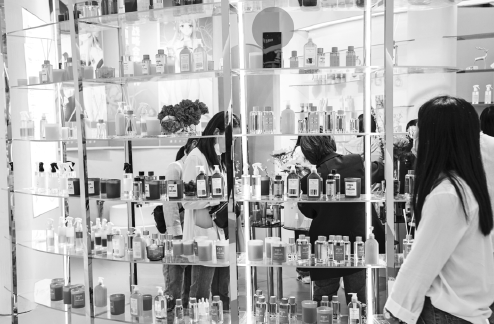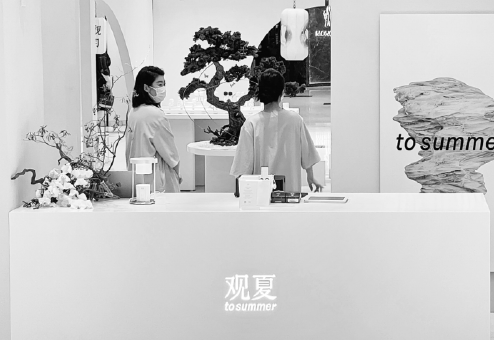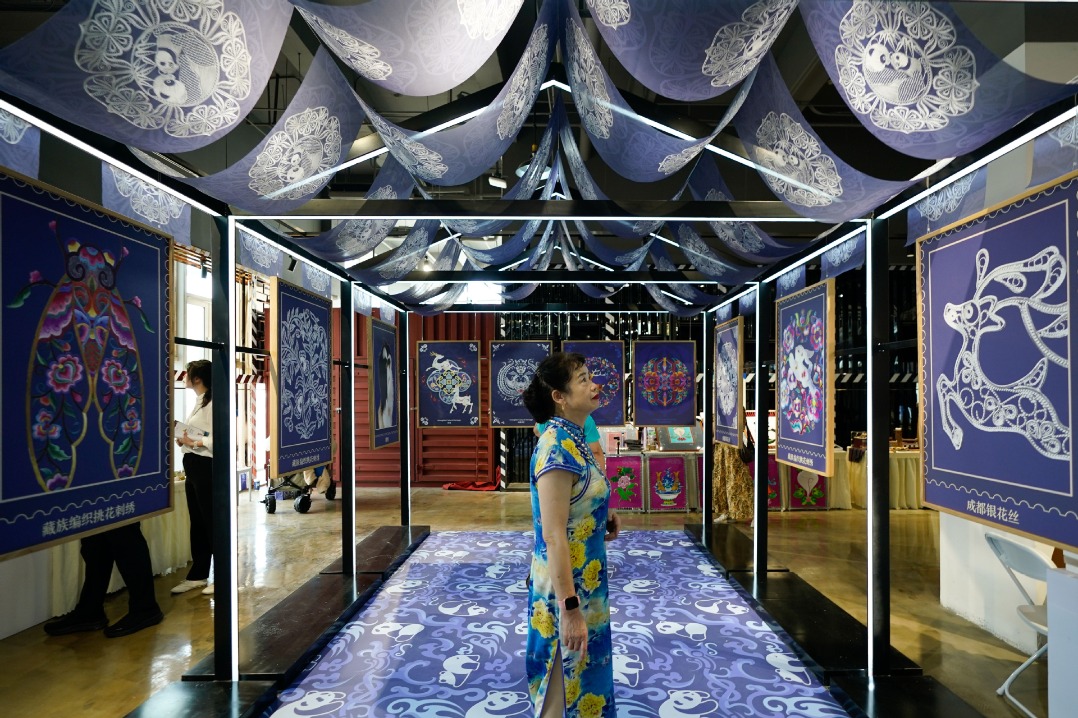Scents make big sense for perfume makers
Lifestyle changes after pandemic alter buying habits, help lift sector's market prospects

Thanks to consumption upgrades and improving living standards, China's perfume and fragrance market is embracing rapid development.
Yuan Tiantian, a 35-year-old fashion designer in Beijing, is a perfume enthusiast. In her house, there is a small refrigerator where she stores a collection of perfumes — around 20 bottles. In addition, she uses a variety of fragrances to enhance the aesthetics of her rooms — lavender-scented fragrance in the bedroom, rose scent in the bathroom, and ginger scent in the living room.
"I am a fan of perfumes. I spend nearly 6,000 yuan ($833.9) on perfumes and fragrances every year," Yuan said.
According to a report from market consultancy iiMedia Research, in 2021, China's perfume market totaled 13.6 billion yuan, up 24.8 percent on a year-on-year basis. In contrast, the country's cosmetics market overall grew 15 percent year-on-year. By 2025, China's perfume market is expected to grow to 30 billion yuan.
"From perfumes to fragrances, there are an increasing number of brands emerging in the market. Chinese consumers are using perfumes and fragrances in a variety of scenarios, contributing to surging demand," said the report.
The Guangdong province-based online research consultancy forecast that China's fragrance market will reach $5.3 billion by 2026, while Euromonitor International estimated that in the coming five years, the growth rate of China's perfume market will triple that of the world.
Data from Qichacha, a platform offering information on companies in the country, said that by May, there were over 180,000 enterprises that operate fragrance-related businesses. Newly registered enterprises in the field within one year were over 15,000.
While international cosmetics brands explored China's perfume market at an early stage, leading international companies — such as Italian outerwear brand Moncler and Spanish luxury leather brand Loewe — also wafted into China's perfume market in recent years.
In 2022, Moncler launched its perfume portfolio in Shanghai, and Loewe opened a fragrance store in Nanjing, Jiangsu province. Meanwhile, global fragrance company Firmenich opened its perfume experience center in Guangzhou, Guangdong province, and announced it would expand its presence in China.
The global capital market also favors the industry. Data from online business statistics provider itjuzi.com showed that between 2014 and 2022, 35 major investment deals were made in China's perfume market, with renowned investors including Sequoia China, IDG Capital and ZhenFund.
What is noteworthy is that apart from domestic investors, foreign companies are also actively investing in China's fragrance market. In October 2019, Swiss fragrance maker Givaudan invested in Chinese perfume and cosmetics brand Next Beauty China. In 2021, Beijing-based fragrance company Scent Library received a B-round investment from Spanish fashion and fragrance company Puig. In September 2022, Shanghai-based fragrance company Documents received an investment of over 10 million yuan from Cathay Capital and French cosmetic products giant L'Oreal Group.
Influenced by the pandemic, people have more time to spend at home, and thus are exhibiting increasing requirements for creature comforts and aesthetics while cooped up indoors. People are increasingly eager to fill the daily corners of their lives with fragrances, such as lighting aromatherapy candles, using rattan aromatherapy and essential oils, strategically placing fragrant stones and herbs, and hanging sachets in order to create more comfortable environments.
Hong Yong, an associate research fellow at the e-commerce research department of the Ministry of Commerce, said: "With the improvement of people's living standards, consumers have increasing demand related to their personal images and quality of life, and using fragrances has become an effective way of meeting their needs. People are paying increasing attention to physical and mental health, and the soothing and healing effects of fragrances are attracting more and more consumers. In addition, the popularity of social media makes the spread of information easier, and consumers are gaining interest in novel and unique products, offering business opportunities for niche fragrance brands."
Sensing the business opportunities, numerous domestic fragrance brands have emerged. For example, To Summer, a Beijing-based fragrance brand, sold 1,000 units of products on the first day when its store opened. Its bestseller sold out in three seconds.
The brand takes advantage of the concept of Oriental plants, and creates fragrances from natural flora. Furthermore, the brand is good at creating beautiful fragrance-themed stories. Different fragrances combine humanities, history and culture, to depict a scene with an Eastern artistic concept. In addition, each fragrance comes with a memorable name, such as boiled snow from the Kunlun Mountains and steamed tea using plum water.
"Different from other brands, To Summer has clear brand positioning, integrating Eastern culture into new modernism," said Liu Huipu, founder of To Summer.
Apart from fragrances, to enrich its product portfolio, To Summer also launched scented candles in 2020, aromatherapy shower gel and perfumes in 2021, alongside tarragon charcoal hand sanitizer in 2022. The products have proved popular among consumers.
Scent Library, another Beijing-based fragrance company, develops perfume based on special memories. Its popular perfume scents include cold boiled water, milk candy and cherry blossom, along with whip cream and red berries.
"We tried to unearth memories, emotion and cultural commonalities deeply rooted in Chinese people's lives, and discovered that many Chinese families have experienced using aluminum kettles to boil water. Cold boiled water is among Chinese people's summer memories, offering consumers a very familiar smell," said Lou Xiaozhi, founder of Scent Library.
Data from the company showed that Scent Library's cold boiled water perfume set a record of selling 400,000 bottles in a month, and 1 million bottles in a year. Its milk candy-scented perfume sold 14,000 bottles within 10 minutes of launch.
The investment team of Puig said that under the background of consumption upgrades and the rise of Generation Z (those born in the midto late-1990s and into the 2000s), China's perfume market has been growing rapidly, making Puig decide to invest in the sector.
"Scent Library's distinctive Chinese cultural attributes, originality as well as its differential brand positioning blew our mind. Therefore, we invested in the company," said the investment team of the Spanish fashion and fragrance giant.
Other domestic brands are also making efforts to attract consumers in niche sectors. For example, Nature Scents, a local fragrance brand founded by a few young artists, mainly offers fragrances with nature-based scents. One of its popular fragrance products depicts the smell of "spring water flowing slowly through the weeds", while other products feature osmanthus flowers and sandalwood.
"By replicating natural odors, we aim to evoke consumers' nostalgia for the countryside, and reflect on the meaning of fragrances based on true emotional memory, hoping to truly bridge the gap with users," said the spokesperson of Nature Scents.
Marc Puig, chief executive officer of Puig, said: "We are confident about China's fragrance market. With its large population base and the innovation of local companies, we are looking forward to seeing more business opportunities in the market."


Today's Top News
- China urges US to end unilateral tariffs after court ruling
- Tariffs threaten global green push
- China-Central Asia cultural tourism train inaugurated
- Asian security model for regional peace
- China condemns US plan to revoke students' visas
- Mayors vow to boost friendship of cities






























